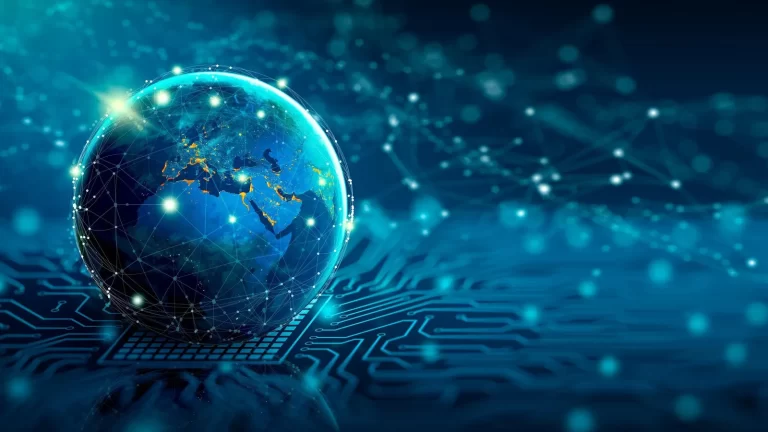The Future of Technology: How Innovation is Shaping Our World
Introduction
Technology has become an integral part of our daily lives, transforming everything from how we communicate to how we work, shop, and entertain ourselves. Over the past few decades, we’ve seen technological advancements that were once considered science fiction become part of our reality. As we look ahead, it’s clear that innovation will continue to shape the future in ways we can only begin to imagine.
In this article, we’ll explore the latest trends in technology, how they’re impacting various industries, and what the future may hold as we continue to evolve in the digital age.
The Rise of Artificial Intelligence (AI) and Machine Learning
AI and Automation in Everyday Life
Artificial Intelligence (AI) has seen explosive growth in recent years, and its impact is already being felt across various sectors, including healthcare, finance, entertainment, and transportation. AI algorithms are capable of analyzing vast amounts of data and providing insights that humans would find difficult or impossible to discover on their own.
In everyday life, AI is already at work in applications like virtual assistants (e.g., Siri, Alexa), personalized recommendations on streaming services (e.g., Netflix, Spotify), and even self-driving cars. But the real power of AI lies in its ability to automate complex processes, optimize systems, and solve problems that were previously beyond human reach.
Machine learning, a subset of AI, enables systems to learn from data and improve their performance without explicit programming. This means that AI can continuously adapt and refine its responses, leading to smarter, more efficient technology.
AI in Healthcare and Medicine
AI’s role in healthcare is one of the most promising areas of innovation. From predictive analytics that help doctors make early diagnoses to robotic surgery and personalized treatment plans, AI has the potential to revolutionize how we approach healthcare. AI-powered systems are already being used to analyze medical images, predict patient outcomes, and develop new drugs.
In the near future, AI could even help create more effective treatments by analyzing genetic data and customizing therapies for individual patients. As we move toward personalized medicine, AI will play a critical role in advancing healthcare and improving patient outcomes.
The Internet of Things (IoT): Connecting Our World
A More Connected Future
The Internet of Things (IoT) refers to the network of interconnected devices that communicate with each other via the internet. These devices range from smart home gadgets like thermostats and security cameras to wearables that track health data, such as smartwatches. IoT has the potential to revolutionize industries by enabling real-time data collection and automation.
In smart homes, IoT allows for seamless integration between devices, creating an intelligent ecosystem where everything is interconnected. For instance, your thermostat can adjust the temperature based on your habits, and your refrigerator can notify you when you’re running low on groceries.
IoT in Business and Industry
In business, IoT is already being used for asset tracking, supply chain optimization, and predictive maintenance. Sensors and smart devices can monitor equipment performance in real-time, alerting businesses to potential failures before they occur, thus minimizing downtime and reducing operational costs.
Moreover, IoT technology is enhancing customer experiences by providing businesses with valuable insights into consumer behavior and preferences. By gathering data from connected devices, companies can tailor their products and services to meet the specific needs of their customers.
5G Technology: The Next Generation of Connectivity
The Promise of 5G
5G, the fifth generation of mobile network technology, promises to bring faster speeds, lower latency, and more reliable connectivity. Unlike 4G, which has served as the backbone of mobile communication for years, 5G is designed to handle the growing demands of data-heavy applications and an increasingly connected world.
With 5G, download speeds could be up to 100 times faster than current 4G networks, making it possible to stream high-definition videos, play augmented reality (AR) and virtual reality (VR) games, and transfer large files with minimal delay.
Impact on Industries and Everyday Life
Beyond just faster internet, 5G will enable new technologies and innovations. For instance, the roll-out of 5G networks will accelerate the adoption of self-driving cars, enable remote surgery, and enhance the capabilities of IoT devices. In urban environments, 5G can support smart cities by connecting sensors and devices to improve traffic management, energy efficiency, and public safety.
In addition, 5G will provide the infrastructure needed to support augmented and virtual reality applications, offering immersive experiences in gaming, education, and training that weren’t previously possible with slower networks.
Blockchain and Cryptocurrencies: Redefining Trust and Transactions
What is Blockchain?
Blockchain technology, originally developed as the backbone of cryptocurrencies like Bitcoin, is a decentralized and transparent digital ledger system. Transactions on a blockchain are recorded in a secure and immutable manner, making it virtually impossible to alter past records. This has made blockchain particularly appealing for applications beyond cryptocurrency.
Blockchain’s ability to provide secure, transparent, and traceable transactions is opening up new possibilities for industries like finance, supply chain management, healthcare, and voting systems. For instance, blockchain can be used to track the provenance of goods, ensuring their authenticity and preventing fraud.
Cryptocurrencies and the Future of Finance
Cryptocurrencies, such as Bitcoin and Ethereum, have garnered significant attention as an alternative form of currency. While still volatile, cryptocurrencies have the potential to disrupt traditional financial systems by providing a decentralized, borderless, and secure way to transfer value.
As more companies and institutions begin to accept cryptocurrencies, and as blockchain technology becomes more widely adopted, the landscape of finance may change dramatically. Digital currencies and blockchain could pave the way for more efficient and inclusive financial systems, particularly in regions with limited access to traditional banking.
The Future of Work: Remote and Hybrid Models
Remote Work and Digital Transformation
The COVID-19 pandemic accelerated the shift to remote work, and many companies have continued to embrace this model even as the world returns to a sense of normalcy. Advances in communication and collaboration tools, such as video conferencing software, project management platforms, and cloud computing, have made it easier than ever for teams to work from anywhere.
As more businesses adopt remote and hybrid work models, the future of work is likely to be defined by flexibility, innovation, and digital transformation. Remote work offers employees greater autonomy, while businesses can tap into a global talent pool and reduce operational costs.
AI and Automation in the Workforce
AI and automation are also playing a significant role in the future of work. Many repetitive tasks, such as data entry, scheduling, and customer service inquiries, are being automated, freeing up employees to focus on more strategic and creative tasks.
However, this also raises concerns about job displacement and the need for reskilling. As technology continues to evolve, workers will need to adapt by learning new skills and staying ahead of the curve to remain competitive in the job market.
Conclusion
Technology is evolving at an unprecedented pace, and its impact is felt across every industry and aspect of daily life. From artificial intelligence and IoT to blockchain and 5G, these innovations are transforming how we live, work, and interact with the world around us.
As we look to the future, it’s clear that technology will continue to drive change, offering both opportunities and challenges. By embracing innovation, staying informed, and adapting to new technologies, we can ensure that we’re prepared for the exciting possibilities that lie ahead in this ever-evolving digital age.




